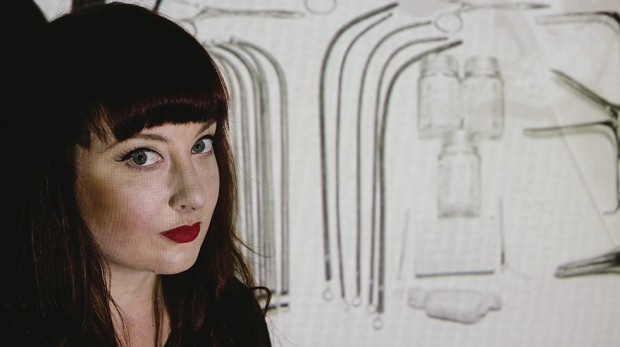 Noted Perth singer and musician Rachael Dease presents her latest work, a song cycle inspired by the famed Golden Record carried on the Voyager space probe, as part of Fringe World. We seek some insight from the creator herself.
Noted Perth singer and musician Rachael Dease presents her latest work, a song cycle inspired by the famed Golden Record carried on the Voyager space probe, as part of Fringe World. We seek some insight from the creator herself.
You recently returned from a sojourn in Hobart for MONA FOMA. How was that?
Goddamn, what a pocket of magic that place is. It was completely insane taking five days off while prepping a new show, but it was the excuse I needed to finally see Hobart and MONA, and it was worth all the subsequent anxiety. Ben Frost and Swans were definitely highlights. MONA is incredible, I just want to live in it.
How did you become involved with the Forever Now project? How does that relate to your work on From A Small, Distant World?
I think Cat Hope posted that they were taking submissions, and my ears pricked up. I’d started thinking a few months before about a work based around the 1977 Golden Record that went up with the Voyager Missions, and had been reading about the love story of Carl Sagan and Ann Druyan. It was a perfect storm of love and art and science, which is pretty much what fuels my own life. Anyway, I was asked to do Women Of Letters at a similar time, and while I was writing that, it became very clear what my next project should be. 2014 was the beginning of a space zeitgeist, in my opinion. I’ve got theories on why, but that’s for another time!
What was the genesis of From A Small, Distant World?
Much like City Of Shadows, it was a subject that seemed to follow me everywhere. It really is like a haunting. I get weirdly obsessive about something and all the other ideas fade into black until I capture it. As well as the Golden Record, and that love story, it was also the collection of sounds from places I would never visit that made up my holy trinity of space obsession. I loved the fact that art and science seemed to marry in those few months in 1977. It was strange and brave and beautiful.
How has the project changed since its initial inception?
Well, it was always going to involve Brian (Kruger), Hayley (-Jane Ayres), Aaron (Wyatt) and Tristen (Parr) again. The addition of Jo Grech on guitar seemed natural, because we’d played together recently, and he’s got that knack of being able to read my mind. Anyone that’s worked with me will tell you that’s a plus. Brian calls it “a kind of voodoo.” I think I started this project thinking it was going to be relatively easy because of the vast amount of material available, but the opposite was true. It’s actually made it quite laborious at times. I also found trying to force a narrative didn’t work, the sounds create the narrative.
Can you give us some insight into the actual practical process of creating this work?
I spent a lot of time sifting through hours of recordings from the Voyager missions, which made me go a bit mental actually. There’s hundreds of hours taking up hard drive space all over the house. The actual writing process is usually fast and furious. I choose segments that may work, and bring them to the musicians. We arrange as a team, which this time was a lot easier considering our history together. They really are incredible musicians, and put in time and energy well beyond the call of duty.
As a child, did you have a fascination with space travel and exploration? What’s your relationship to those ideas now?
I did, but like most children, it was slightly terrifying. I was worried about the sun exploding. I was worried about not existing. I couldn’t sleep because I couldn’t visualise an end to the universe. But if I ever did, that was even more frightening. Now I find it incredibly liberating. Feeling small in this vastness makes me relax, and almost maniacally happy. Any large scale work I do, in hindsight, is always something I need to do, almost as a form of therapy. The concept of talking about ones everyday feelings to a stranger is an odd concept to me, it feels bourgeois and myopic. Immersing myself in the sounds and images of something much bigger than myself is both humbling and comforting. It’s what people seek in religion, I guess. But that’s for the next work.
What explicit themes are you exploring here?
Not so much a theme, but the whole process has helped me understand the “overview effect,” which is this cognitive shift in awareness experienced by some astronauts and cosmonauts during spaceflight. After seeing the fragility of earth hanging in space, the “pale blue dot” protected by a thin atmosphere, void of international boundaries, they felt a sense of placement, of peace. If I could do anything, it would be for people to experience a small part of that through sound. This is certainly the first incarnation of the work, and a snapshot of the amount of material I’ve been collecting, so I think it will develop further.
TRAVIS JOHNSON
From A Small Distant World is on at the Art Gallery Of Western Australia from Friday, January 30, until Sunday, January 1. For tickets and session times, go to fringeworld.com.au.